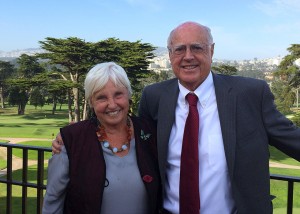 With a $10 million gift to the Center for Healthy Minds, Bob and Dottie King promote the study of children’s emotional health.
With a $10 million gift to the Center for Healthy Minds, Bob and Dottie King promote the study of children’s emotional health.
Mental illness is one of the most common afflictions affecting young Americans, with about one-fifth of adolescents suffering from a diagnosable psychological disorder. And yet as many as seven out of every ten of those teens won’t receive the help they need.
The importance of mental health issues on American youth inspired action from Robert (Bob) and Dorothy (Dottie) King. The couple have given $10 million to UW-Madison’s Center for Healthy Minds and School of Education to promote increased study of children and well-being.
“We’re thrilled to collaborate with UW-Madison in our determination to help disadvantaged youth reach their full potential,” says Dottie Jones King. “We believe the work of Richard Davidson and his colleagues at the center will have a tremendous impact and help thousands — if not millions — of youth thrive.”
The gift will enable the university to recruit new interdisciplinary faculty that focus on children and well-being. Center scientists and staff look forward to a partnership with the Thrive Foundation for Youth, which was founded by the King family to support intensive, caring engagement with disadvantaged youth.
An increasing body of evidence indicates that adolescence is a period when the brain is more sensitive and pliable and presents opportunities to build critical emotional skills to cultivate well-being. The center is leading the development and assessment of mental training strategies derived from contemplative traditions to cultivate healthy qualities of mind in children and adolescents.
“Assessment remains a huge challenge for the field, but it’s what’s critically needed to answer important questions,” says Davidson, founder of the center and William James and Vilas Professor of Psychology and Psychiatry. “How does one measure development of noncognitive factors? How do those measures change with students’ age? Are there some interventions more effective than others? We need to build a common language to measure success.”
UW–Madison Chancellor Rebecca Blank says the gift is vital for the university to continue pioneering high-impact strategies in the state of Wisconsin and beyond.
“The University of Wisconsin-Madison has long been involved in research to improve the lives of children and this gift helps us continue to pursue groundbreaking research in this area,” Blank says. “I am grateful for the support of outstanding alumni like Dottie Jones King and the partnership with the Thrive Foundation for Youth that helps us pursue research and education that truly makes a difference in Wisconsin and beyond.”
Faculty recruits to the center and School of Education were also made possible through the generosity of longtime university supporters John and Tashia Morgridge, who inspire and match donations for new and enhanced professorships.
“We are pleased that part of our gift will be used to support the generous matching gift established by John and Tashia Morgridge,” says Bob King. “We have always believed in leveraging our philanthropy with others’ efforts, and are thrilled to be partnering with the Morgridges to support the university and the extensive reach its research has throughout the world.”
